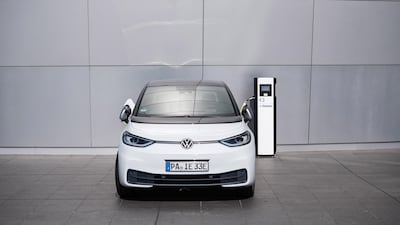A team of researchers claim they have devised an alternative electrode material that significantly cuts the charging time of batteries and increases the range of electric vehicles.
Commercial success for electric vehicles (EVs) is largely dependent on the time taken to recharge the batteries.
These days, it takes around 30 minutes to charge an EV to 80 per cent.
An international team led by the Institute of Chemistry at the Chinese Academy of Sciences in Beijing slashed that time by more than two-thirds, bringing the charging time down to less than 10 minutes in a laboratory setting.
An electric vehicle with such a battery could travel 966 kilometres on a single charge, according to the researchers, compared to the on-market Tesla Model S which has a range of 644km.
The findings were published in the journal Science on Thursday.
The real success will depend if these batteries can be put in commercial electric vehicles.
The breakthrough “will significantly raise [EVs’] competitiveness against fuel cars”, said co-first author Sen Xin, a professor at the institute.
Electric vehicles are fast becoming a competitive alternative to their traditional counterparts, with the International Energy Agency predicting demand for oil will plateau by 2030 because of global uptake of EVs.
According to the Global EV Outlook 2020, the sales of electric cars reached 2.1 million globally in 2019.
Tesla, considered a bell-weather of the market, delivered a record number of cars worldwide in the third quarter of 2020, beating analysts’ estimates.
In the UAE, regulators have sought to incentivise EV purchases with free charging offered through the end of 2021.
Dubai has also offered free parking to EVs for the next two years. Still, few consumers have made the switch to all-electric in the emirate, with only 1,800 cars eligible for the free-parking scheme.
But improvements to lifespan, range and charging speeds may make an EV more enticing.
Indeed, those factors are the “holy grail of battery research”, said Hengxing Ji, professor at the University of Science and Technology of China, who participated in the study.
"We aim to search for an electrode material that can make a dent in performance metrics from laboratory research and can hold the promise to stand with the industrial production techniques and requirements.”
The researchers turned to black phosphorus, a material that has been considered for use before but is typically abandoned due to its tendency to be degraded along its outer edges, making it less efficient.
By combining black phosphorus with graphite, the research team found that the chemical bonds between the two materials stabilise and prevent the problematic breakdown.
With this novel technology, the researchers plan to pursue industry-related questions on ways to scale composite material production in more mild conditions and with consideration for price and practicality.
This is critical, Billy Wu, a senior lecturer in energy and manufacturing at Imperial College London, told The National.
“The challenge here will likely be how cost effective their solution is at scale as there are lots of potential alternatives, but few scale well.”












